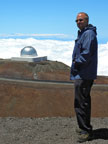Team Biographies

Bernie Raucher
Deputy Integrated Science Instrument Module Project Scientist
Bernie Rauscher is an experimental astrophysicist. He currently serves as the James Webb Space Telescope Detector Scientist and Integrated Science Instrument Module (ISIM) Deputy Project Scientist. Rauscher has led, and continues to lead, numerous smaller projects. He has over 25 years of practical experience with infrared array detectors. His primary research interests are infrared astronomy instrumentation and the nature of Dark Matter and Dark Energy in the Universe. Rauscher specializes in near-infrared astronomy instrumentation and cosmology.
Rauscher was sitting in England in his first faculty appointment at the University of Durham reading a book about the successor to the Hubble Space Telescope when he decided to make a change. He figured that he could either stay in academia, or jump on an opportunity to break into the start of something big - the James Webb Space Telescope.
Rauscher grew up in Silver Spring, Md., always knowing he wanted to be a scientist. His fascination with science was furthered by his two grandfathers' influence. When he was less than 10, one of his grandfathers gave him a microscope and a copy of Paul de Kruif's "Microbe Hunters."" The other began covertly teaching him trigonometry and other mathematics, as well as a deep respect for Sir Isaac Newton and Galileo Galilei.
Years later, he obtained his B.S. in Physics from Rensselaer Polytechnic Institute and S.M and Ph.D. in Astronomy and Astrophysics from the University of Chicago.
Rauscher has served as Principal Investigator for numerous sub-orbital projects developing and testing next-generation and photon-counting detectors for space and ground applications.
As a part of the Webb team, Rauscher won a Congressional Space Act Award in 2004 for the development of the detectors for Webb. He once also worked as part of a team that built one the first astronomical telescopes in the South Pole, as well as another that built two of the main cameras at Apache Point Observatory in New Mexico.
In his free time he enjoys cooking, skiing, SCUBA diving and learning to horseback ride. He enjoys traveling to Rome and elsewhere. And he still has that microscope.




